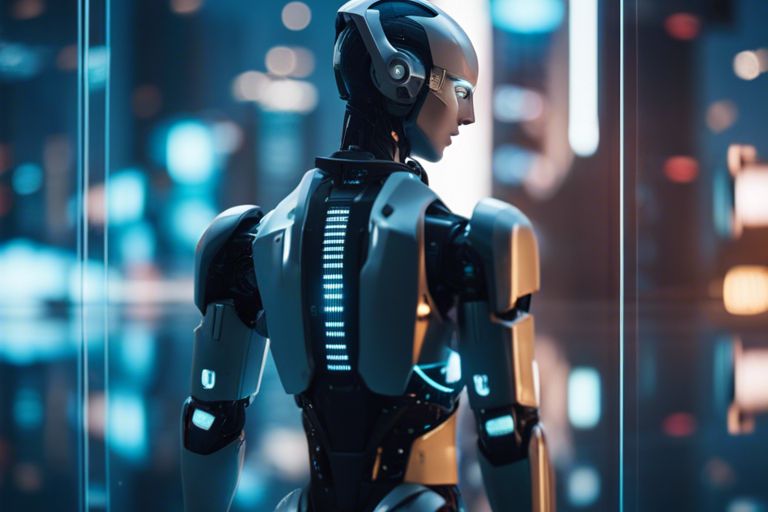What Is Endpoint Protection And Why It’s Critical For Cyber Security
You need to understand that endpoint protection is a vital component of your cyber security strategy. This technology...

Over the past few years, artificial intelligence (AI) has dramatically transformed various industries, from healthcare to finance, and continues to revolutionize the way we interact with technology. This groundbreaking technology has the potential to optimize processes, enhance decision-making, and improve efficiency on a scale never seen before. However, with these advancements also come concerns about privacy, security, and ethical implications that need to be carefully addressed. In this blog post, we will explore how AI is reshaping the future of technology and the impact it will have on our daily lives.

It is fascinating to witness the continuous evolution of artificial intelligence and its impact on various aspects of our lives. According to How artificial intelligence is transforming the world, AI technologies are revolutionizing the way we work, communicate, and interact with the world around us. Let’s explore some of the remarkable advancements in AI technologies that are shaping the future.
One of the most significant breakthroughs in AI is the advancement of machine learning and deep learning algorithms. These technologies have enabled computers to learn from data and make decisions without explicit programming. Machine learning algorithms can analyze large datasets and identify patterns, while deep learning models, inspired by the human brain’s neural networks, can process complex information and perform tasks like image recognition and natural language processing at a remarkable speed and accuracy.
Natural Language Processing and Speech Recognition
Speech recognition and natural language processing have made tremendous strides in recent years, thanks to AI technologies. Speech recognition systems can now accurately transcribe human speech into text in real time, enabling hands-free communication and improving accessibility for individuals with disabilities. On the other hand, natural language processing allows machines to understand and interpret human language, enabling applications such as chatbots, language translation, and sentiment analysis.
Recognition
One of the most exciting developments in natural language processing and speech recognition is the integration of these technologies into virtual assistants like Siri, Alexa, and Google Assistant. These AI-powered assistants can now engage in natural conversations, perform tasks, and provide personalized recommendations based on individual preferences. The ability of these systems to continuously learn and adapt to user behavior is a testament to the incredible advancements in AI technologies and their potential to enhance our daily lives.

An array of emerging technologies is reshaping traditional industries, with artificial intelligence (AI) playing a central role. Machine learning algorithms are enhancing efficiency, accuracy, and speed across sectors such as healthcare, finance, manufacturing, and retail. AI-driven solutions are revolutionizing these industries by automating tasks, predicting outcomes, and personalizing customer experiences.
Natural language processing (NLP) is enabling machines to understand and generate human language, revolutionizing customer service and digital marketing. Additionally, computer vision is transforming industries like autonomous vehicles, agriculture, and security by enabling machines to interpret and make decisions based on visual data. These advancements are propelling sectors to new heights of innovation and competitiveness.
The integration of AI is reshaping the economy by bringing about significant economic impacts and transformations in the job market. While AI is creating new opportunities for growth and efficiency, it is also raising concerns about job displacement and the future of work. The increased automation of tasks previously performed by humans is shifting the skills required in the job market.
AI’s influence in the economy is multi-faceted, as it not only streamlines operations but also poses challenges related to workforce displacement and reskilling needs. Businesses must adapt to the changing landscape by embracing AI technologies while also addressing the socioeconomic impacts on workers and communities. Balancing the benefits and challenges of AI adoption is crucial for a sustainable future economy.
Across industries, the strategic implementation of AI systems can yield substantial benefits in terms of cost savings, productivity gains, and innovation. However, it is imperative for organizations to navigate the ethical implications and impact on jobs to ensure a smooth transition into an AI-driven economy. By leveraging AI responsibly and thoughtfully, businesses can pave the way for a transformative future where technology and human ingenuity work in harmony.
Considerations of ethics and potential bias in AI technology are crucial as we move towards a future increasingly driven by artificial intelligence. Many researchers and experts emphasize the importance of mitigating bias in algorithms to ensure fairness and equity in decision-making processes. Transparent AI systems that can be audited for bias are important to building trust in AI technologies.
Furthermore, data privacy and security concerns pose significant challenges in the ethical deployment of AI. Ensuring that personal data is protected and used responsibly is critical to upholding individual rights in the age of AI.
Implications of ethical considerations and bias mitigation have led to calls for regulatory frameworks to govern the development and deployment of AI technologies. Frameworks that mandate transparency and accountability in AI systems can help address ethical concerns and mitigate risks associated with bias and privacy violations.
Regulatory frameworks must balance the need for innovation and economic growth with ethical imperatives to safeguard individual rights and public trust in AI technologies. Collaboration between stakeholders including governments, industry leaders, and researchers is important to developing effective regulatory frameworks that promote ethical AI.
All eyes are on the future of The Future of AI is Now as we venture into uncharted territories of technological advancement. The rapid evolution of Artificial Intelligence (AI) is reshaping industries, businesses, and everyday life. What lies ahead in AI promises to be nothing short of groundbreaking.
An exciting area of growth in the AI landscape is the development of more sophisticated AI systems that can not only perform tasks but also learn and adapt in real time. This will lead to more personalized user experiences across various applications, from healthcare to entertainment. Additionally, AI is expected to increasingly permeate industries such as autonomous vehicles, finance, and cybersecurity, revolutionizing the way we work and interact with technology.
Furthermore, the fusion of AI with other emerging technologies like the Internet of Things (IoT) and blockchain is predicted to open up new possibilities for automation and data security. As AI continues to advance, we can expect to see greater integration of AI-powered solutions in smart homes, cities, and businesses, paving the way for a more connected and efficient future.
For all its promise, the rapid advancement of AI also raises significant challenges and opportunities. One of the key challenges is ensuring the ethical and responsible use of AI, especially as it becomes more autonomous and impactful. Addressing issues of bias in AI algorithms and establishing transparent governance frameworks will be crucial in building trust and mitigating potential risks.
To navigate these complexities and harness the full potential of AI, interdisciplinary collaboration and continuous innovation will be necessary. Governments, businesses, researchers, and society as a whole must work together to shape policies, standards, and practices that promote AI’s responsible development while fostering creativity and competitiveness.
A: Artificial intelligence (AI) refers to the simulation of human intelligence processes by machines, particularly computer systems. AI is revolutionizing technology by enabling machines to perform tasks that typically require human intelligence, such as visual perception, speech recognition, decision-making, and language translation. This technology is transforming various industries, including healthcare, finance, transportation, and entertainment.
A: AI is reshaping the job market and workforce by automating repetitive tasks, increasing efficiency, and enhancing productivity. While AI technologies may displace certain jobs, they also create new opportunities for individuals to upskill and reskill in roles that require human creativity, critical thinking, and emotional intelligence. Organizations are increasingly integrating AI into their operations to streamline processes and drive innovation.
A: As AI continues to advance, ethical considerations become increasingly important. Concerns related to privacy, bias, accountability, transparency, and job displacement must be addressed to ensure the responsible development and deployment of AI technologies. It is crucial for policymakers, industry leaders, researchers, and the public to collaborate on establishing standards and regulations that promote the ethical use of AI and prioritize the well-being of society.
You need to understand that endpoint protection is a vital component of your cyber security strategy. This technology...
You rely on robust cybersecurity measures to protect your business from evolving threats, and Endpoint Detection and...